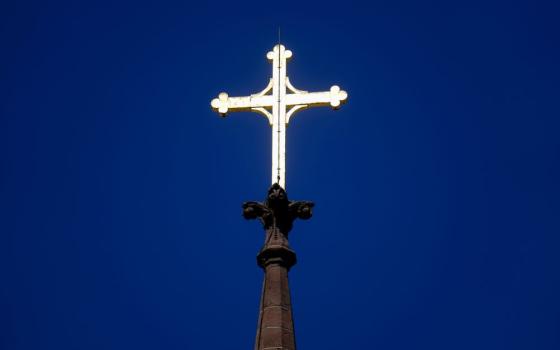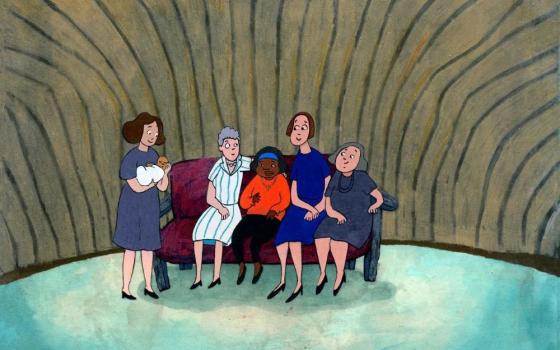People sit on a platform as they wait to board a train at a railway station in Jammu, India, May 10. Two Catholic nuns and an Indigenous youth who were arrested on July 25 at Durg railway station in Chhattisgarh state were granted bail and released Aug. 2 under strict conditions. They were arrested for alleged human trafficking and forced conversion in central India. (OSV News/Reuters/Adnan Abidi)
Two Catholic nuns and an Indigenous youth jailed for alleged human trafficking and forced conversion in central India have been released on bail under strict conditions by a special court dealing with terror cases.
A National Investigation Agency court, or NIA, at Bilaspur in Chhattisgarh state granted bail on Aug. 2 to Srs. Vandana Francis and Preeti Mary and Sukhuman Mandavi, whose arrest led to huge outrage among Christians across the nation.
The women religious are members of Assisi Sisters of Mary Immaculate, a Franciscan congregation of the Eastern rite Syro-Malabar Church, along with Mandavi, were arrested on July 25 at Durg railway station in the state.
Mother Superior Isabel Francis of the Assisi Sisters told The Indian Express: "Never have we ever faced such a charge (of forceful religious conversion) in our history."
She said their religious community started about 75 years ago as an intervention to heal leprosy. "We then branched out into general medicine and education — we run schools for the mentally challenged and health clinics in Chhattisgarh."
Both Vandana and Preethi have "sacrificed about 30 years of their lives for the poor," Sister Isabel told the Indian Express.
"Some of our sisters are now learning the law so that we can battle such trumped-up charges."
The NIA court, which primarily deals with cases related to terrorism, has restrained the nuns from leaving the country without its prior permission during the investigation.
They were asked to surrender their passports, report to the police station near their residence every two weeks and avoid tampering with the evidence.
The court further barred the nuns and Mandavi from addressing the media, saying they "shall not give any press interviews nor make any public comments in connection with the case."
Any violation of these conditions can lead to the cancellation of bail, it warned.
All three were released from jail on Aug. 2 after they furnished a bond of 50,000 Indian rupees ($570) and two guarantors of the same amount for each person.
The nuns had gone to the Durg railway station on July 25 to pick up three women, ages 19 to 22, who were to be employed as domestic help in convents.
Mandavi had accompanied the young women during their journey from their village to the railway station.
They were accosted by activists of Bajarang Dal, a hardline Hindu organization, who accused them of trafficking the young women to convert them to Christianity.
However, the NIA court mentioned in its order that "the parents of the three victims have filed their affidavits stating that the accused persons/applicants have not allured or forced or coerced their daughters for religious conversion or human trafficking."
The Indian Express reported that when the future Sr. Preeti was a little girl, she would regularly meet with nuns from her parish at Elavoor in Kerala's Ernakulam district. The eldest of seven siblings, she entered religious life when she was in her early 20s.
Early on, she was a philanthropist, her family members told The Indian Express. "Whenever she came home, she would pack food, clothes and medicines for the poor in Chhattisgarh," M Baiju, her younger brother, told the local paper. A trained nurse, his sister found prayer and healing equally important, he said. "She believes in helping those who are ailing from diseases. She used to constantly tell us about the plight of the poor in North Indian cities."
Advertisement
The young women, according to local media reports, are planning to file a complaint against the Hindu activists who harassed them at the railway station and also later at the police station.
The women alleged that they were assaulted and coerced by the Bajrang Dal members into giving false statements against the nuns and Mandavi.
"The entire incident is a clear case of violation of fundamental rights of the accused and the women," said Govind Yadav, a Supreme Court lawyer based in New Delhi.
The nuns, the Indigenous youth and the young women can seek legal action against the Hindu activists and the police officials "who arrested them without a prima facie probe into the baseless allegations against them."
"The case of trafficking and conversion cannot be sustained in the trial as the women and their parents, who are adults, have refuted the charges in writing," Yadav told UCA News on Aug. 4.
The three accused can approach the high court, the top court in the state, to quash the case against them. The police can also file a closure report, he added.
In a scathing editorial on Aug. 3, Deepika, a Malayalam daily published by the Catholic bishops in India's Kerala state, slammed the growing Hindu fundamentalism in the country under the patronage of governments in different states.
The nuns are natives of Kerala, and the southern state saw huge protests against their arrest.
The editorial reminded the people that Hindu fundamentalism had gained a presence in the country and was suppressing the voices of minorities, especially Christians.
Persecution against Christians has steadily increased since 2014 when Prime Minister Narendra Modi came to power, according to the United Christian Forum, based in New Delhi, the nation's capital.
The number of incidents of persecution against Christians rose from 127 in 2014 to 834 in 2024, reported the ecumenical group, which tracks such incidents.
Christians make up 2.3% of more than 1.4 billion people in India, nearly 80% of whom are Hindus.




